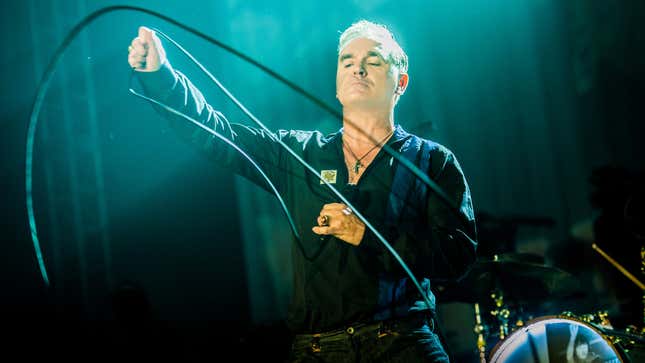
Morrissey has never made it easy on people who prefer to separate art from artist, but that was often part of his appeal. Even during his star-making days with The Smiths—a magical five-year run in the ‘80s that resulted in the band’s canonization—the singer was known for forcefully speaking his mind about pretty much anything that popped into it. He wasn’t just a faceless singer in a beloved indie band, but a spokesman for the sullen—a celibate vegetarian who hated the monarchy (among other things) but also advocated fiercely for things he loved and believed in. (The Queen = bad; Oscar Wilde = good.) It’s a big part of why he was both deeply loved and frequently reviled.
His solo years—30-plus at this point—have been even trickier, as Morrissey’s real-world pronouncements have flirted with racism and xenophobia, displaying a shocking lack of empathy. He called the Chinese a “subspecies” for their treatment of animals, he may or may not have pooh-poohed the sexual-assault allegations against Kevin Spacey, and he has recently declared his support for a British political party that has a deep fear of Muslims at the core of its platform. He wore a For Britain—that’s the group—lapel pin on a recent Jimmy Fallon appearance, which was either a stunt to promote his new album or a brazen dare to his longtime fans to finally abandon him. A third and more upsetting reason: He believes in For Britain, and he doesn’t care what anyone else thinks or feels about it.
So what does all of that have to do with what ought to be the most innocuous kind of release—an all-covers album—for an aging pop hero to make? Well, besides the obvious question of whether fans will want to remain allegiant to a singer whose values presumably fall far from their own, there’s actually something pointed in some of the songs that Morrissey has chosen for California Son. It’s almost as if he wants people to know that he hasn’t transformed completely into a right-wing loon, and that he still supports some of the progressive causes he always has. To wit: One doesn’t cover Joni Mitchell’s free-flowing, fantastic “Don’t Interrupt The Sorrow” because of its great chorus—it has none—but because it’s a nuanced, painfully smart exploration of feminism. Similarly, there’s no pop-song upside to tackling Bob Dylan’s “Only A Pawn In Their Game.” You do it because it’s a statement about the futility of racism and the pain of American racial history. Elsewhere, Morrissey covers Buffy Sainte-Marie and Phil Ochs, both known as much for their progressive activism as their music. This doesn’t seem like coincidence.
“But what about the music itself?” Morrissey will surely ask with frustration while reading this and every other review of California Son that mentions his worldview. Most of it’s quite good. The aforementioned Mitchell cover works surprisingly well considering its level of difficulty, though the Dylan composition—like many Dylan songs of its type—doesn’t really get off the ground in spite of a strong vocal performance. Roy Orbison’s “It’s Over” is fantastically bombastic in Morrissey’s hands; someday when he decides to do a Vegas residency—which should happen—it’ll be a showstopper. The same goes for Jobriath’s “Morning Starship,” a Bowie-influenced slice of ’70s pomp.
Morrissey has always championed underdogs like Jobriath, and his taste in music is impeccable. He’s been a historian since he was a teenager writing to the British music papers to slag one artist and boost another, so the only thing surprising about an album filled with largely obscure covers is that he didn’t do it sooner. Another highlight is “Wedding Bell Blues,” complete with backing vocals from Billie Joe Armstrong, one of many guests on the album. The roster also includes LP, Ed Droste of Grizzly Bear, and Petra Haden. Ariel Engle of Broken Social Scene sings on “Don’t Interrupt The Sorrow,” but after being schooled on Morrissey’s recent political leanings, she publicly expressed regret for participating.
And there they are again: Morrissey’s politics interrupting the enjoyment of his music—though that’s nobody’s fault but his. Some of For Britain’s views line up with the empathetic Morrissey that his fans know: The group is pro-gay rights (though anti-transgender) and pro-animal rights. But it’s also vociferously beholden to the Great Britain of old, and nearly every other position that it takes comes off as nationalistic and xenophobic, with specific aspects of fundamental Islam apparently causing them the most panic. Morrissey has historically fancied himself a free thinker and a true outsider; it’s just a shame that he’s had to go outside the bounds of decency and empathy in recent years.
It’s always been complicated to be his fan, but it was a fandom that could be worn with a certain amount of pride, even (or especially) in its meekness. “It’s so easy to laugh, it’s so easy to hate / It takes guts to be gentle and kind,” sang 27-year-old Morrissey. It’s a sentiment that 60-year-old Morrissey could use reminding of.
Without the baggage of his political views—which is where the letter grade on this review comes from—California Son would be a worthy addition to a mostly stellar catalog, offering insight into a great singer and lyricist’s taste and breathing new life into mostly forgotten songs. But those who can’t or won’t separate the songs from the performer can’t and shouldn’t be blamed for finding something else with which to stimulate their eardrums—nor could they be blamed for wishing that Morrissey had simply disappeared from public view before entering his foot-in-mouth period.